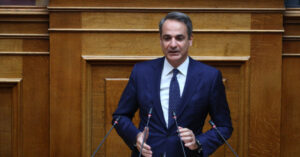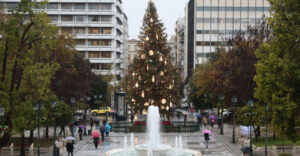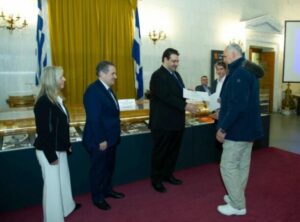Greek Prime Minister Kyriakos Mitsotakis launched a sharp attack against Nikos Pappas from the parliamentary podium, referencing Pappas’ absence during the session. Mitsotakis stated that this will be his approach moving forward, as he does not recognize Pappas as the representative of the main opposition, given that a special court convicted Pappas in a 13-0 ruling. Furthermore, the prime minister’s comment that he “will not greet or exchange pleasantries” has been interpreted as a subtle criticism of Antonis Samaras, who recently greeted SYRIZA’s parliamentary group leader warmly at an event.
The attack on Nikos Pappas:
“I do not recognize as a representative of the main opposition a politician convicted 13-0 by a special court. I am protecting the political system and will neither greet, joke nor engage with him. When the opposition party elects a leader and establishes the structure, I will be here for a proper discussion. Do not be surprised if I walk out; this will be my stance until SYRIZA elects a permanent leader.”
“This is what parliamentary democracy looks like. I am protecting the system with my stance. We are dealing with a temporary opposition leader, and no one knows on whose behalf he speaks — whether it’s for Mr. Kasselakis, Mr. Famellos, or Mr. Gkletsos. When SYRIZA finds its leader and direction, I will be here for a proper, institutional debate. So, don’t be surprised if I leave during your second speech, as this will be my approach until you elect a leader,” Mitsotakis said.
“PASOK has not modernized”
In response to PASOK leader Nikos Androulakis, Mitsotakis remarked that “practically nothing has changed since your re-election.” He noted, “It seems you made a 360-degree turn and are back to where you were before the process began,” accusing Androulakis of attempting to link New Democracy with the far-right. “This isn’t the first time I’ve heard this argument from SYRIZA and PASOK,” Mitsotakis added, pointing out that the Greek public rejected this narrative in the 2023 elections. “We are a center-right progressive force that will defend the significant reforms the country needs,” he said.
Mitsotakis added, “PASOK has not modernized,” questioning whether the party disagrees with the local community-based policy and suggesting this is why citizens are turning their backs on it. According to Mitsotakis, PASOK must prove it can participate in forming a broader political consensus.
With the remark that “this year was the most difficult period of the last 40 years,” Kyriakos Mitsotakis began his opening speech in the parliamentary discussion on natural disasters.
Reviewing this year’s efforts, the Prime Minister noted that while “last year was a very bad year with 1.754 million hectares burned, this year 440,000 hectares burned, with the 20-year average being 500,000.” He added that under the new fire-first-response doctrine, “98% of the total 9,101 fires were dealt with in the first few minutes.”
Watch Kyriakos Mitsotakis’ speech
The Prime Minister’s speech in the Parliament plenary session:
The Prime Minister also mentioned the AEGIS program worth 2.1 billion euros, reminding that by 2027, Greece will be among the first countries to acquire the new Canadair planes, while upgrading the firefighting vehicle fleet and boosting the firefighting personnel.
Addressing Nikos Androulakis, he stated that the climate crisis is not an excuse but a reality, with no political party or color—it is a danger that threatens everyone.
Watch the live discussion in Parliament
Prime Minister’s speech minute-by-minute
- “I am not here to celebrate nor to deny the challenges. I am trying to make as objective an assessment as possible based on data, not slogans. If there are proposals to submit, I am here to listen. And to tell Mr. Androulakis that the climate crisis is not an excuse; it is a reality. It has no party or color and is a danger that threatens everyone. Before the opposition proceeds with nihilistic criticism, it should remember that before 2019, civil protection was in a dilapidated building that would be the first to collapse in a major earthquake. Today, it is a separate ministry. We remember what the operations center was like during your administration. We have made significant progress, and I will not allow it to be dismissed by an opposition that sees everything negatively.”
- “I sincerely thank the volunteers. We have 9,000 volunteers—5,000 in civil protection and 4,000 in the fire department who are certified. Civil society has an important role to play, and I hope this number increases so that we have more additional forces. We need more manpower in the summer than in the winter.”
- In the past, the firefighting doctrine was limited to waiting on roads or firebreaks, but now we aim for interventions within the forest.
- We hired 500 forest commandos in 2021, 650 in 2023, and an additional 400 will join new units in Zakynthos, Chania, and other areas.
- Through the AEGIS program, we are procuring 1,950 new firefighting vehicles, 235 of which will be delivered by next summer.
- We will acquire new aircraft capable of water collection from seas and lakes, replacing the older PZL planes.
- We will also have 13 new helicopters that can both drop water and transport small teams of firefighters. Leasing costs are significant, so it is worth considering purchasing some of these helicopters. Leasing costs rise every year due to the limited number of available aircraft.
- The most critical pillar of the new civil protection doctrine is investment in future-oriented infrastructure and personnel. I’m referring to the AEGIS program, a 2.1 billion euro investment to strengthen civil protection infrastructure. Currently, 1.7 billion euros worth of projects have been tendered. These are major programs that require international tenders, which are naturally time-consuming. For example, Greece hopes to incorporate new Canadair planes by 2027, replacing the older CL-215s, which will still be necessary until then. The production line has not yet started, and some of these aircraft will be part of the RescEU mechanism.
- In Evia, following the 2021 fire, reforestation efforts progressed promptly. However, these are minimal as experts tell us that reforestation will primarily occur naturally.
- For the Attica fire, 18 erosion control projects have been approved, and two contractors will proceed with reforestation around the Penteli Monastery and the Observatory.
- Significant progress has also been made in restoring damage. The speed of inspections and reports has improved and is now faster than before.
- A major reform occurred two years ago when we transferred the supervision of forest services from the Ministry of Interior to the Ministry of Environment, ensuring horizontal control and the implementation of a cohesive forestry policy. Having firefighters and forest officials coexist in the same control center has aided in extinguishing fires.
- We hope that the country has adopted a culture of evacuations that prioritizes human life. The 112 emergency alert system has proven effective, saving many lives. Stop saying it’s used as an excuse for things supposedly not being done. It’s unfair and wrong to dismiss it for petty political disputes.
- Regarding firefighting, we initiated two efforts: using technology for monitoring, immediate detection, and quick suppression. For the first time in Attica, drones flew 24/7. Additionally, during high-risk summer days, aircraft and helicopters were on standby to attack fires at their early stages before they could grow. This way, we extinguished the overwhelming majority—over 98% were put out while still small.
- At the same time, we are providing incentives for citizens to insure their homes against natural disasters, and for these individuals, the ENFIA property tax is reduced by 10%.
- We have tightened penalties for arson, even in cases of negligence. There were tragic incidents where people tasked with civil protection responsibilities started fires and will face legal consequences.
- We want citizens to be allies in this effort. It’s not enough for the state alone to handle everything. Citizens should take care of their properties. The platform for clearing plots resulted in over 830,000 property owners declaring that they cleared their land. We also received 8,000 complaints about uncleared areas in urban fringes. It was a collective success for the country and a recognition by society that we cannot expect everything from the state. Along with collective responsibility, there is individual responsibility.
- 400 million euros were allocated for preventive measures, such as firebreaks, clearing plots, and interventions in urban forests. For the first time, a program like this was launched with real impact, significantly aiding during the challenging fires we faced this summer.
- Our plan is based on 4+1 pillars, with prevention being the first.
- The Mediterranean is at the epicenter of the climate crisis and will face challenges in the coming years.
- Last year was a very bad year, with 1.754 million hectares burned, compared to 440,000 hectares this year, with a 20-year average of 500,000 hectares.
- Ms. Konstantopoulou, you ask why I behave the way I do. My behavior is proportional to the respect shown in Parliament.
- This year, we had 9,101 fires compared to 7,163 last year. Burned areas—let’s avoid saying “all of Greece burned.”
- The state mechanism was on alert for six months. A big thank you to all the personnel.
- This year was expected to be difficult, and it turned out to be the most challenging of the last 40 years. We consistently had higher-than-average temperatures, strong winds, and drought following a long period of aridity. These conditions—drought, winds, dry storms—are what we will face with greater frequency from now on.
Ask me anything
Explore related questions





